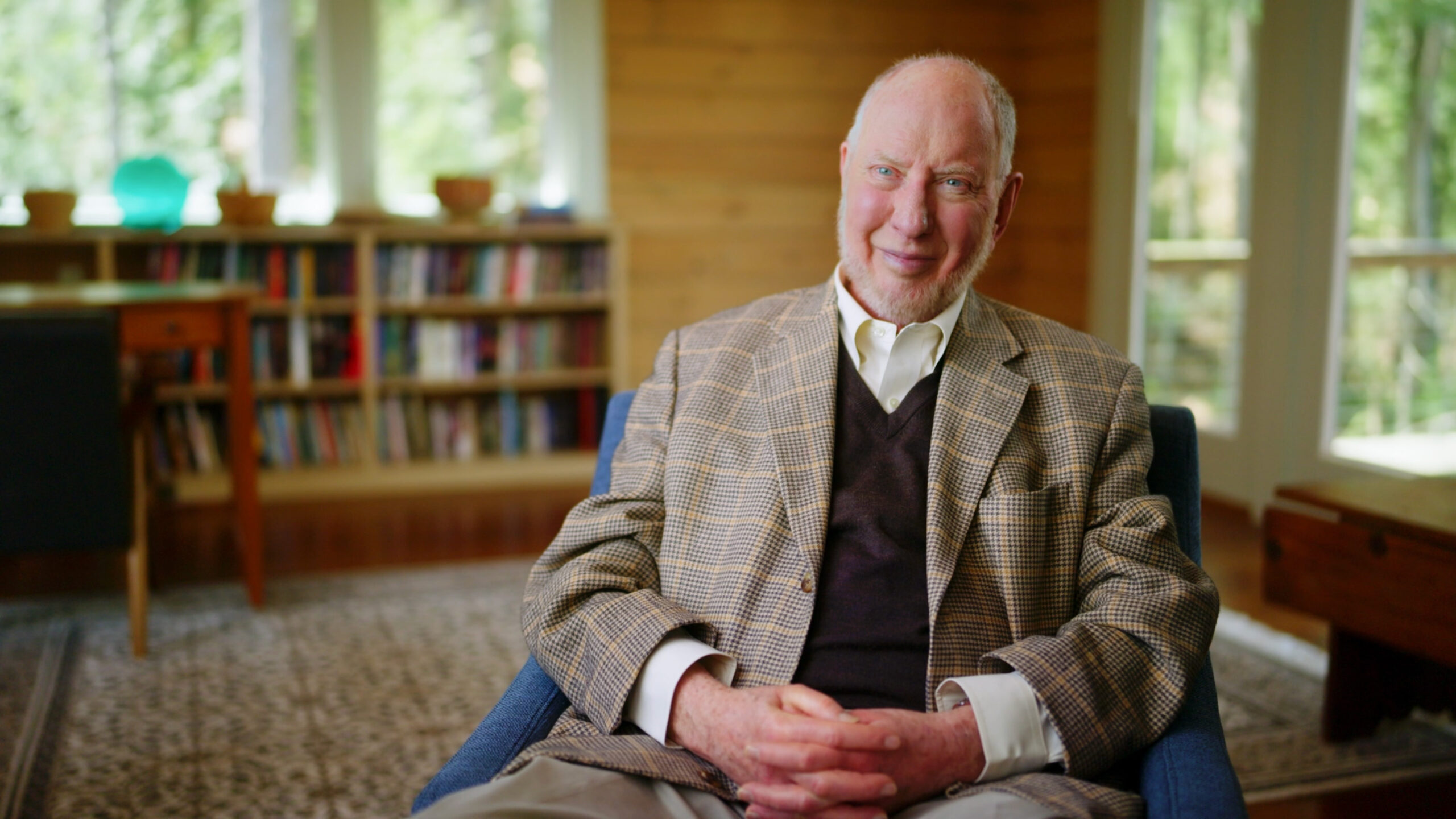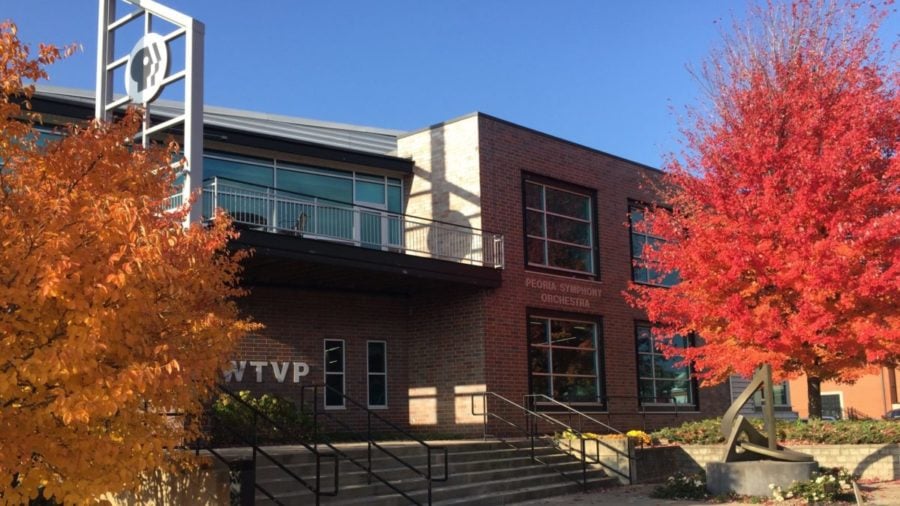MPR and nonprofit Braver Angels want Minnesotans to ‘disagree better’ about politics
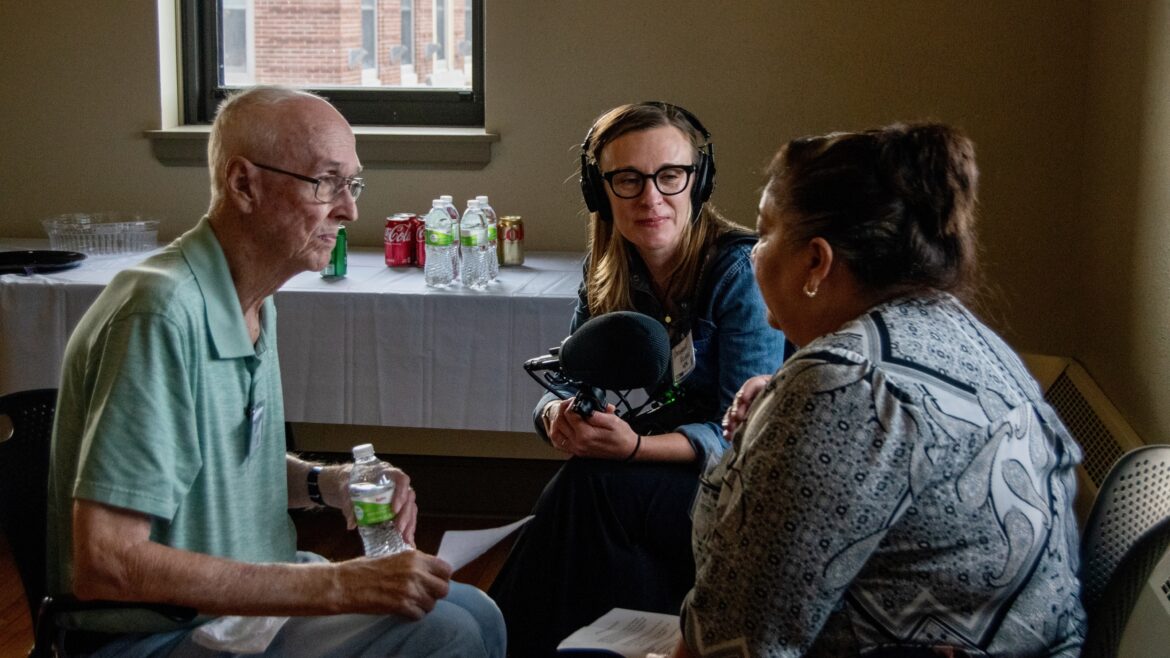
Lorna Benson / MPR News
Art Frame and Luz Macias Cazares exchange stories about how their families came to Worthington, Minn., at an event co-sponsored by MPR and Braver Angels July 9 in Worthington.
Minnesota Public Radio correspondent Catharine Richert knew there must be a better way.
Over years of covering politics, disinformation and COVID, she’d interviewed people who had cut off loved ones because of who they voted for and friend groups fractured over the COVID vaccine. And she met people so sick of fighting that they had checked out of politics — and voting — altogether.
In the past, “I really thought it was really important that we say, ‘This person is lying, and this person is right,’” says Richert, who joined MPR in 2011. “I became very disenchanted with that practice because I just didn’t feel like it was actually helpful for people. I didn’t think it was moving the needle in terms of getting us all on the same page.”
In a bid to get Minnesotans on the same page, last year Richert came up with the idea for Talking Sense. The multilayered reporting project, produced in partnership with the nonprofit Braver Angels, is changing how people and public media talk about politics during this pivotal election year.
‘Great synergy’
Talking Sense, officially launched in February and slated to run through the end of the election cycle, has three elements: an online app, in-person workshops and weekly reporting, all aimed at helping individuals and communities build the communications skills needed to navigate disagreements constructively.
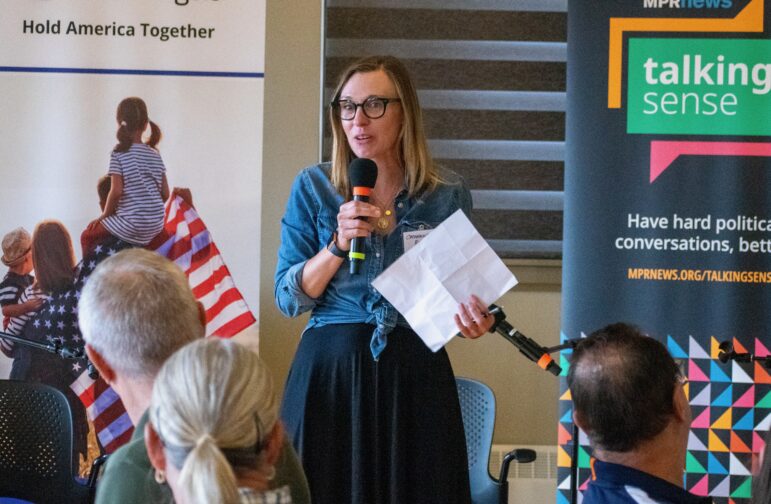
Richert handles the reporting side, and she recruited Braver Angels, which co-founder Bill Doherty says has a mission “to depolarize America,” to develop the app and lead workshops around the state.
Founded in Minnesota in 2016, Braver Angels is well known for its success in helping “reds” (conservatives) and “blues” (liberals) have more constructive dialogue across their differences. Since then, the organization has grown to 109 local alliances and over 12,200 members nationwide.
“I’d always been really interested in this idea that in political disagreements, maybe we don’t always have to win our argument, maybe one of us doesn’t have to be right,” says Richert. “I thought … wow, it’d be so cool to partner with Braver Angels because they have all this experience and all this knowledge that we as reporters do not have, nor are we equipped to function as facilitator or workshop mediator.”
Doherty, a professor of family social science at the University of Minnesota and a frequent guest on news shows, including MPR’s, was immediately on board.
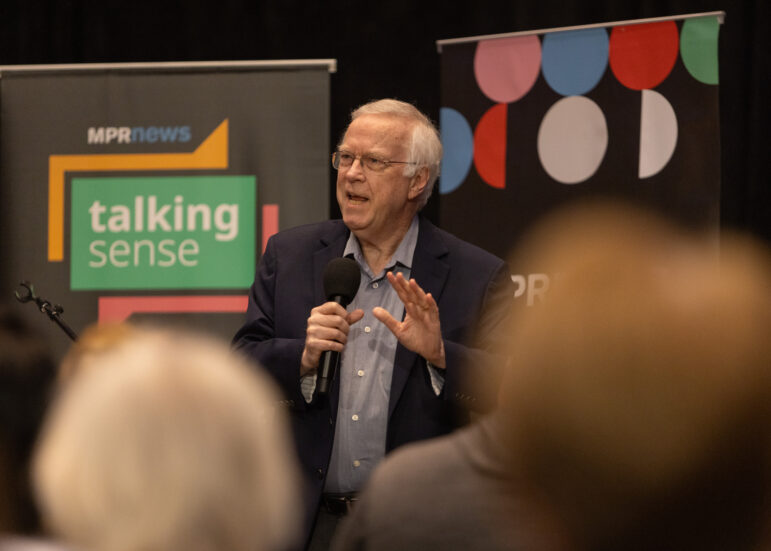
“I jumped at the opportunity,” says Doherty, who first met Richert when she interviewed him for an MPR segment on vaccine hesitancy in 2021. “There’s great synergy between the outreach statewide that MPR has … and then what we can do in terms of content and facilitation.”
For Talking Sense, Braver Angels has customized its two main offerings, engagement workshops — “where you bring people together who have a difference, and they engage in conversation,” says Doherty — and communication skills training.
Doherty worked closely with Richert to develop content for the app, an online iteration of the latter.
Soft-launched last December in time for thorny holiday conversations, says Richert, the app guides people through conversations about hot-button issues, including abortion, climate change, COVID, elections, guns and policing.
“That’s part of the Braver Angels ethic,” says Doherty. “Just go for it. There’s nothing, nothing off the table for a conversation.”
The app offers strategies and talking points based on the topic and the communication style of the person you are talking to. For example, it suggests using “I” statements when talking to an argumentative “Defender” type to prevent a discussion from escalating.
“We … used these communication styles that were kind of fun: the Gladiator, the Defender, the Sniper … so injecting a little humor in it,” says Doherty. “What was really great is that we made those characters both liberal and conservative.”
‘On the road’
In addition to the app, Richert envisioned live events that would add value for communities while extending both organizations’ reach.
“The second thing that I pitched as part of this project is taking Talking Sense on the road around the state and going to communities where Braver Angels, and maybe MPR, don’t have a huge presence to stand up workshops that really help the community navigate whatever particular situation they’re going through,” says Richert.
MPR, funded by what Richert calls “a very small internal grant,” foots the bill, while Braver Angels handles registration to ensure that a balance of reds and blues attend. Doherty facilitates the workshops.
One of their most recent events took place in Worthington, a community of around 14,000 people that has undergone significant demographic shifts in the past decade. More than 40% of the city’s residents are Hispanic, according to U.S. Census data, a 10% percent increase since 2010. Many are economic migrants from Latin America drawn to work opportunities in local meatpacking plants.
During the first 40 minutes of the storytelling workshop, available to watch on YouTube, Doherty moderated a conversation between Riley Widboom, whose family came to Worthington in the 1930s to farm, and Mayan-Guatemalan immigrant Eligio Ramirez Sandoval. The two men could not be more different in appearance, background and access to opportunities. But the more they talked, the more their shared values of family and community showed through.
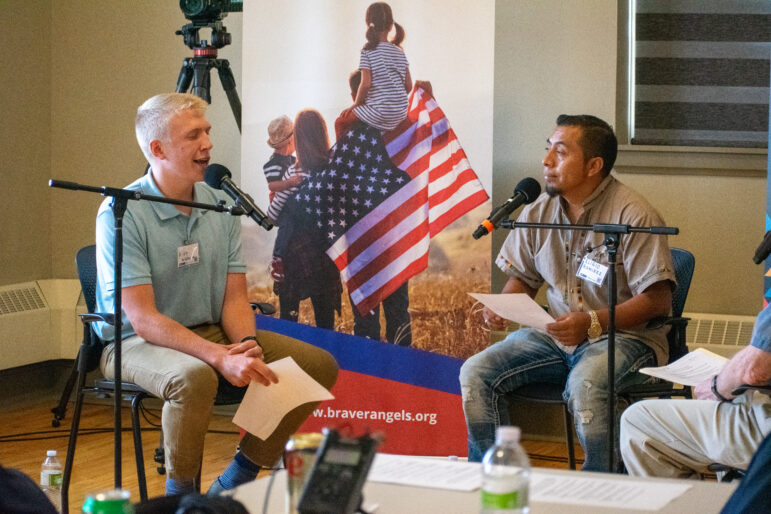
“What I learned is that his family are immigrants also, and I learned that he wants to do the best for the community,” said Sandoval, responding to a prompt from Doherty. “The common thing that we have [is] our families are immigrants, so we are all immigrants to be in this place.”
MPR has “always had a statewide presence,” Richert says, with six regional bureaus and 45 stations. But there are still parts of the state such as Worthington “that we just don’t get to” and that Talking Sense events are helping MPR access, she says.
“When we were in Worthington, so many people there said, ‘I’d never heard of MPR, but I am excited to listen to it now, because I know my community is going to be reflected on the air because of this event that you just did,’” she says.
Including the comparatively small Worthington workshop, Talking Sense has held four events since February, with plans for two more by the end of the year. Richert estimates that around 230 people have attended the workshops, exceeding her initial expectations.
“I knew going into this that this would be a big thing, but [at] the events so far … people show up who never registered,” says Richert. “We are at capacity and then some every single time. It’s wild to me that this is happening.”
For example, Skills for Disagreeing Better, hosted in April with the University of Minnesota Rochester, drew more than 100 college students and community members. The demographically and politically diverse attendees worked in pairs to practice focusing on shared values rather than opposing policy views.
“We had a lot of older folks from the community come [and] a lot of young people from the university come,” says Richert. “I was looking out into the audience and was like, ‘Yes, we nailed it!’”
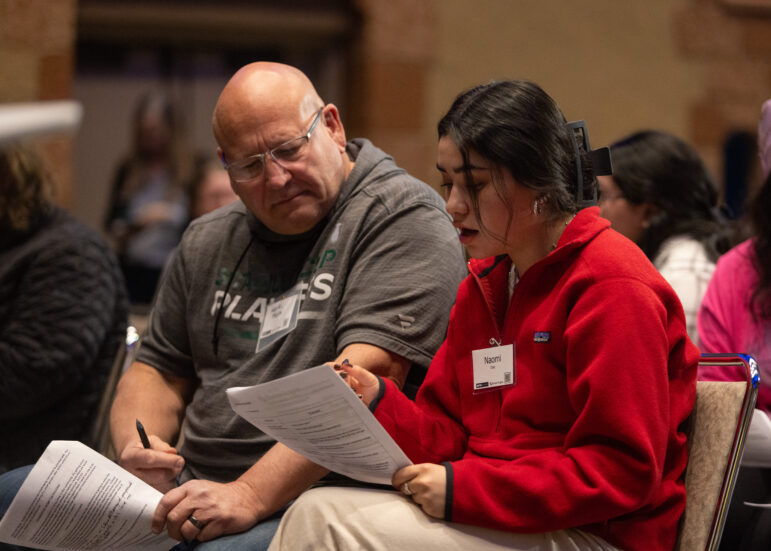
The live events are a win for Braver Angels, too.
“We’ve already achieved much more name recognition, much more awareness around Minnesota about what we do and, secondly, further penetration of the tools and ideas and philosophy,” says Doherty. “… Those are the two outcomes we’ve been hoping for.”
‘Mutual enlightenment’
Initially, though, not all of Braver Angels’ leadership, intentionally composed of reds, blues and “some who don’t identify with either,” was sure about partnering with MPR, says Doherty.
“Minnesota Public Radio has a reputation among conservatives, among reds, as liberal, as blue,” he says. “We had to work through some concerns among our red leaders about whether we were getting in bed with a liberal, progressive organization.”
Ultimately, red leaders were won over by the prospect of continuing to consult informally with MPR post–Talking Sense, focusing on “bridging that divide between conservative Minnesotans and MPR” through “getting to know one another and just mutual enlightenment,” says Doherty.
“Very often we [reporters] encounter situations where people are like, ‘I don’t trust you. I will not talk to you.’ And that’s such a vicious cycle, right?” says Richert. “[I]f we aren’t getting those voices on air, we’re not doing our job, we’re not depolarizing our audience. … I really feel like newsrooms, including ours, but everywhere, have some deep thinking to do about how we can actually be more inclusive.”
Weekly stories for Talking Sense, primarily by Richert, air every Tuesday in an attempt to do just that.
So far, the station has aired nearly 40 stories. According to Richert, Talking Sense pieces are among the station’s top three most read and listened-to in any given week.
The first story MPR aired was about Ely, Minn., a historic mining town dating back to the 1880s that is situated alongside the state’s protected Boundary Waters, a pristine wilderness environment and tourist attraction.
In recent years, deep schisms have formed between Ely residents who want to expand the mining industry to support job growth and those who want to prioritize environmental protection and tourism. The debate intensified to the point that people were fighting in the streets and bad-mouthing each other on social media, says Richert.
Exhausted by the conflict, a critical mass of concerned Ely citizens ultimately decided to form their own Braver Angels chapter.
“I went to one of their first meetings and did a story to sort of launch [Talking Sense] around this very specific issue that is very specifically important to people living in this community,” says Richert. “This was like the scene-setter, and I think it was a great way to sort of explain to our audience why we were doing this project.”
Subsequent stories have been “a little bit of everything,” she continues. There have been feel-good pieces, like one about Minnesota state legislators coming together every Arbor Day to plant trees. Another profiled conservative talk radio host Al Travis, who is “trying to depolarize the airwaves, which is just so counterintuitive,” says Richert, by inviting progressives on his show to discuss topical issues. Many of the pieces are Q&As “because they are easy to produce,” she adds.
Other stories are pegged to serious news events and exemplify what the strategies embodied by the Talking Sense app and workshops look like in real life. (Spoiler: They look way messier.)
For example, an interview that aired in March explored how St. Paul’s diverse, all-female, all-Democratic city council members finally surmounted their differences to craft a cease-fire resolution in the wake of the Oct. 7 Hamas attack.
In an eleventh-hour pivot from the story she had planned for the week, Richert interviewed council member Rebecca Noecker, who is Jewish and lost someone she knew in the attack, and her colleague, Cheniqua Johnson. Rather than discuss the council’s conflict, Richert intentionally steered the interview toward how the group eventually reached consensus, she says.
“They had this really heartfelt conversation with me about all of the challenges they had to work through internally … and why they all felt good about it in the end, even though they didn’t win everything they wanted,” Richert says. “I was really proud of that, and I think that that piece got a lot of attention for [those] reasons.”
Talking Sense is slated to wind down at the end of the year, with a possible extension into early 2025 to continue election coverage. But the lessons MPR has gleaned through the process point to a way forward for future programming.
Like many public media organizations, MPR faces the ongoing challenge of producing content that resonates with core audiences in metro areas and attracting younger, more diverse listeners — all while improving its representation of rural and conservative viewpoints, Richert says.
“One thing that I so appreciate about MPR right now is that we are very conscious of the fact that we are speaking to really different audiences simultaneously, and we are trying to do that really well,” says Richert. “It’s a big challenge, but it’s a wonderful challenge to have when we’re trying to be everything to everyone.”
Talking Sense also presents a model for other stations looking to depolarize politics and better reflect the viewpoint diversity of the communities they serve.
“[T]o survive and continue to be relevant to our audiences, we need to think outside the traditional radio package,” says Richert. “We need to be physically out in our communities more. We need to be partnering with organizations. … I really hope this is a key takeaway for us and for other public media newsrooms out there, that we shouldn’t be afraid to partner with non-media organizations to be more relevant in our communities.”
As for Richert, when she returns to her job as MPR’s Southeast Minnesota correspondent — a role in which she covers everything from health care to “a small community trying to capitalize on all the sinkholes they have as a tourism attraction” — she plans to take the Talking Sense ethos with her.
“It’s … dawned on me that people are so much more than what we think they are, and I carry that forward with my reporting,” says Richert. “I want that to show. I want that to shine through.”





